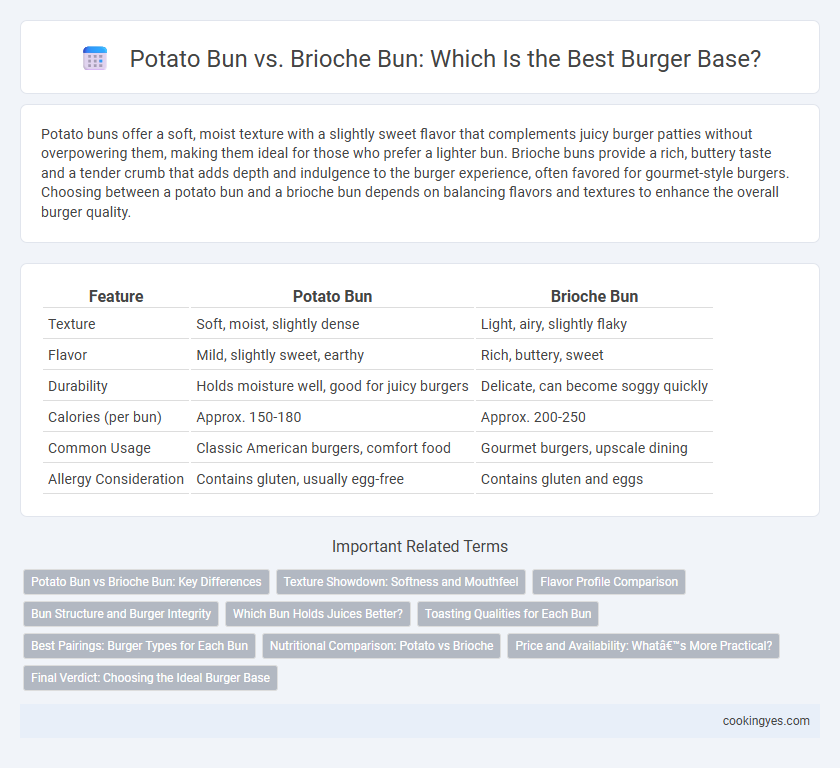Potato buns offer a soft, moist texture with a slightly sweet flavor that complements juicy burger patties without overpowering them, making them ideal for those who prefer a lighter bun. Brioche buns provide a rich, buttery taste and a tender crumb that adds depth and indulgence to the burger experience, often favored for gourmet-style burgers. Choosing between a potato bun and a brioche bun depends on balancing flavors and textures to enhance the overall burger quality.
Table of Comparison
| Feature | Potato Bun | Brioche Bun |
|---|---|---|
| Texture | Soft, moist, slightly dense | Light, airy, slightly flaky |
| Flavor | Mild, slightly sweet, earthy | Rich, buttery, sweet |
| Durability | Holds moisture well, good for juicy burgers | Delicate, can become soggy quickly |
| Calories (per bun) | Approx. 150-180 | Approx. 200-250 |
| Common Usage | Classic American burgers, comfort food | Gourmet burgers, upscale dining |
| Allergy Consideration | Contains gluten, usually egg-free | Contains gluten and eggs |
Potato Bun vs Brioche Bun: Key Differences
Potato buns feature a soft, slightly sweet texture with added moisture from potato flour, creating a tender yet sturdy base ideal for juicy burgers. Brioche buns offer a rich, buttery flavor and a slightly denser crumb due to the higher butter and egg content, enhancing the overall taste experience. While potato buns provide a mild sweetness and fluffy consistency, brioche buns deliver a more decadent and savory foundation, influencing the burger's flavor profile and texture.
Texture Showdown: Softness and Mouthfeel
Potato buns offer a pillowy softness with a slightly dense, moist crumb that holds up well against juicy burger patties without falling apart. Brioche buns provide a rich, buttery texture that is light and airy, delivering a melt-in-the-mouth experience but can be more delicate under heavy toppings. The choice between potato and brioche buns greatly influences the burger's overall mouthfeel, balancing firmness and tenderness according to preference.
Flavor Profile Comparison
Potato buns offer a subtly sweet, soft texture with a slightly earthy flavor that complements the savory elements of a burger without overpowering them. Brioche buns provide a rich, buttery taste with a tender crumb, adding a decadent sweetness that enhances gourmet burger recipes. Both buns create distinct flavor profiles, with potato buns leaning toward mild and comforting, while brioche buns bring a luxurious, slightly sweet character.
Bun Structure and Burger Integrity
Potato buns offer a denser, moister crumb that provides excellent structural integrity, preventing sogginess and maintaining the burger's shape under juicy toppings. Brioche buns feature a lighter, fluffier texture with a delicate crumb that can absorb sauces but may risk collapsing with heavier fillings. The choice between potato and brioche buns significantly impacts the burger's overall stability and bite consistency, influencing both presentation and eating experience.
Which Bun Holds Juices Better?
Potato buns feature a dense, moist crumb that helps retain burger juices more effectively than brioche buns, which are richer but typically lighter and more delicate. The starch content in potato buns enhances moisture absorption, preventing the bun from becoming soggy quickly. Brioche buns, while flavorful, tend to soak up juices faster due to their airy texture, making potato buns the superior choice for maintaining burger juiciness.
Toasting Qualities for Each Bun
Potato buns offer a dense yet soft texture that crisps nicely when toasted, creating a sturdy base that holds up well to juicy burger patties without becoming soggy. Brioche buns feature a rich, buttery composition that toasts to a golden, slightly crisp exterior while maintaining a tender interior, enhancing the overall flavor profile of the burger. Both buns excel in toasting qualities but differ in texture and richness, with potato buns providing durability and brioche buns offering a more decadent bite.
Best Pairings: Burger Types for Each Bun
Potato buns are best paired with classic cheeseburgers and crispy chicken sandwiches, as their soft, slightly sweet texture complements savory, juicy fillings without overpowering them. Brioche buns, rich and buttery, enhance gourmet burgers featuring caramelized onions, blue cheese, or bacon, adding a decadent flavor that balances bold ingredients. Choosing the right bun elevates the overall burger experience by harmonizing texture and taste specific to each burger style.
Nutritional Comparison: Potato vs Brioche
Potato buns contain fewer calories and less sugar compared to brioche buns, making them a lighter option for burger lovers seeking a healthier alternative. Richer in carbohydrates and dietary fiber, potato buns offer more sustainable energy and improved digestion benefits than the often higher-fat brioche buns. Brioche buns, while softer and richer in taste due to butter and egg content, typically have increased saturated fats and sugars, impacting overall nutritional value and calorie count.
Price and Availability: What’s More Practical?
Potato buns generally cost less and are more widely available in grocery stores and restaurants, making them a practical choice for budget-conscious burger vendors. Brioche buns, often priced higher due to their rich ingredients and artisanal preparation, can be less accessible in some markets but offer a premium texture and flavor. Evaluating local supplier options and menu pricing strategies helps determine which bun aligns best with business practicality and customer expectations.
Final Verdict: Choosing the Ideal Burger Base
Potato buns offer a soft, slightly sweet texture that holds up well against juicy burger patties without overpowering the flavor, making them ideal for those seeking a balanced bite. Brioche buns, rich and buttery with a tender crumb, enhance the overall taste but may become soggy faster under heavy toppings. The final verdict depends on preference: potato buns for durability and subtle sweetness, brioche buns for indulgence and richness.
Potato bun vs Brioche bun for burger base Infographic

 cookingyes.com
cookingyes.com